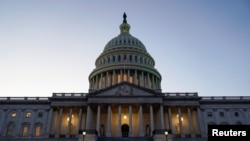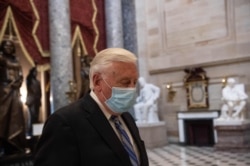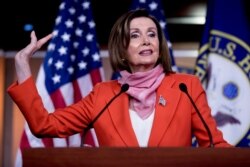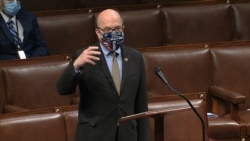The U.S. House of Representatives reversed course Tuesday, scrapping plans to return to Washington next week amid concerns the coronavirus has not been contained in the region around the nation's capital.
The reversal is the latest sign that lawmakers are still struggling to adapt to the unprecedented challenge of a global pandemic and to be comfortable with new online platforms.
As a result, one of the nation's three branches of government still has no plan in place to function remotely during a crisis.
Seven members of the House have tested positive for the coronavirus, with an additional 31 members self-quarantining after suspected contact with an infected person. To date, only one senator, Rand Paul, has tested positive for the coronavirus.
In announcing the change, House Majority Leader Steny Hoyer said he would be meeting Tuesday with House Republican leadership and chairs of the House Rules and Administration committees to work out a delayed plan for lawmakers to do some of their work remotely.
"We can operate the committees virtually and they could get work done," Hoyer told reporters. We can "have hearings, have markups, report bills out so that we will have product to consider at a time when we are back in session."
A planned April 23 vote that would have instituted remote voting procedures was canceled after House Republicans expressed concern about the changes. House Speaker Nancy Pelosi has reluctantly come around to the idea of changing decades-old rules about voting. But Hoyer has enthusiastically endorsed moving lawmakers' work to online platforms.
"I'm hopeful that we can get there in (the) relatively near future," Hoyer said. "Members will be working very, very hard at home and then working very, very hard to come and pass major pieces of legislation on the floor of the House. We can also operate our committees effectively as long as we are under these constraints."
Liz Hempowicz, director of public policy at the Project on Government Oversight, said a compromise along these lines is needed.
"Technologically speaking, it's totally possible," she said. "The difficulty comes in when we're talking about there's not really a will, a leadership in the Congress to institute some of these measures that would allow Congress to operate in a more normal way."
House rules require members be present for a vote. But the planned change would have allowed proxy voting, a process in which a member who is physically present in the U.S. Capitol for voting is also authorized to cast a vote for a member who is not present. That departure would have been allowed for only a 60-day period, when Capitol officials determined there was an emergency.
"We cannot let the way things have been done in the past, though, blind us to the way things should be done in the future. The status quo has become unacceptable and dangerous — not just to members of Congress, but more importantly, to everyone we come in contact with," Congressman Jim McGovern wrote in a Washington Post editorial Tuesday.
McGovern is chair of the House Rules Committee, the group of lawmakers investigating options for the House to operate during an emergency.
Congress is uniquely vulnerable to pandemics because of the way it runs. Lawmakers fly in from their home districts almost every week for three to four days of legislating. They then fly back home after gathering in large numbers with others.
The debate over remote voting hinges on wording in the Constitution requiring lawmakers to assemble, said Hempowicz. But the 231-year-old document was written when that was the only option.
Hempowicz said case law in U.S. courts support "certainly very strong arguments that can be applied to an electronic kind of quorum count, rather than requiring people to be physically on the House floor."
In Britain, where members of Parliament famously bicker with one another in chamber, a plan to function through technology was adopted last week. Under that plan, 50 lawmakers are physically present, while 120 members participate remotely through videoconferencing. The rest of the 650-person body watches from home.
In the U.S., lawmakers have made some adaptations while coming briefly into session to pass coronavirus aid bills. Under that process, smaller groups of lawmakers, organized in alphabetical order, are allowed into the House chamber to vote. Typically, a vote will last 15 minutes, but this procedure stretched the process into several hours.
The Republican-majority Senate has taken a similar approach. The 100 members were able to operate during votes by allowing only a few senators at a time on the floor during votes.
Senate Majority Leader Mitch McConnell was clear that his chamber would return to Washington on May 4.
"This crisis has every part of our society in dire need of stability, clarity and certainty," McConnell said. "The Senate has already stepped up, but our work is not over. I look forward to seeing all my colleagues next Monday."
Both the Senate and House consult with the same Capitol physician when making determinations about the health and safety of lawmakers. The differences in the decisions made by the two chambers show the difficulty leadership is having with finding a middle ground.
"It's creating kind of a false choice between safety and the ability to do the work of the Congress," Hempowicz said. "Really, there are other options that could have been explored and instituted that would have allowed Congress to operate normally from outside of D.C."








